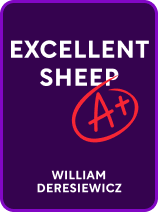

This article is an excerpt from the Shortform book guide to "Excellent Sheep" by William Deresiewicz. Shortform has the world's best summaries and analyses of books you should be reading.
Like this article? Sign up for a free trial here.
Why should you choose a liberal arts education rather than a program that emphasizes career development? How is it advantageous both to you as an individual and to society as a whole?
William Deresciewicz believes that a college education should benefit both students and society. He contends that the ideal education is a liberal arts program that cultivates students’ self-insight and gives them the skills to uphold democracy.
Read more to learn about the benefits of a liberal arts education, according to Deresciewicz.
How the Liberal Arts Benefit Students
One of the benefits of a liberal arts education, says Deresiewicz, is that it nurtures students’ self-insight, which enables them to build a meaningful life. This is possible because of liberal arts’ emphasis on character development.
Self-insight is the process of becoming aware of your values, needs, and desires. The author argues that self-insight is the gateway to designing a meaningful life: You must know your values, needs, and desires before you can build a life around them. Liberal arts professors encourage students to engage in self-insight by providing opportunities for self-reflection as they study the world.
| Other Ways to Develop Self-Insight Deresiewicz doesn’t specify if a liberal arts education is the only way for people to engage in self-insight and build a meaningful life. Other experts claim you can curate your own opportunities for self-insight rather than rely on (likely expensive) formal education to provide them. Here are some ways to create your own opportunities for self-insight: Dan and Chip Heath, authors of The Power of Moments, argue that you can experience self-insight in your everyday life by seeking moments that push you outside your comfort zone. Novel experiences teach you new things about yourself, deepening your self-insight. Another way to achieve self-insight is to learn from your mistakes and flaws. We tend to hold distorted views of ourselves, but we can develop a more accurate self-image by reflecting on our mistakes and welcoming others’ feedback on our areas of growth. Therapy also encourages self-insight. Psychotherapists are trained to ask questions that build your self-awareness and empower you to effectively manage your life. |
How the Liberal Arts Uphold Democracy
The skills students develop in liberal arts programs benefit society as well. Specifically, Deresiewicz argues that liberal arts programs equip students with skills that enable them to uphold democracy. These skills include imagining a better future, communicating that vision, and collaborating with others to make it happen. Skills like these prepare students to contribute meaningfully to democracy because democracies thrive when citizens together envision a better society and take action to make it a reality.
(Shortform note: Experts agree that for democracies to thrive, citizens must have the skills to collaborate with others and advocate for positive change. However, citizens’ political participation is only one element of democracy. For a democracy to thrive, the government must also protect citizens’ civil liberties and ensure each citizen has the opportunity to participate in political decision-making. Therefore, liberal arts programs’ emphasis on training students to uphold democracy is effective only insofar as the government guarantees citizens avenues for such participation.)
Liberal arts professors develop these skills in students first through cultivating their self-insight. The author argues that you must develop a strong sense of self so you can confidently defend your beliefs about improving society. In addition, professors develop students’ capacity for citizenship by pushing them to question their long-held beliefs, exposing them to diverse perspectives, and teaching the art of crafting strong arguments.
(Shortform note: The need to develop the self-insight, awareness of multiple beliefs and perspectives, and argumentative skills required to uphold democracy and create a better future may be even more urgent now than when Excellent Sheep was published in 2014. Expert assessments show that the average quality of democracy around the world is declining. The U.S. is no exception to this trend. While from 2006 to 2016 these assessments categorized the U.S. as a “full democracy,” since 2016, they downgraded it to a “flawed democracy.” This category is for nations that protect peoples’ civil liberties and maintain free elections but also have significant flaws, such as dysfunctional governance and low levels of political participation.)

———End of Preview———
Like what you just read? Read the rest of the world's best book summary and analysis of William Deresiewicz's "Excellent Sheep" at Shortform.
Here's what you'll find in our full Excellent Sheep summary:
- How elite colleges contribute to social inequality and harm students
- The ways that elite schools prioritize profits over teaching
- How governments, schools, and parents can overhaul U.S. higher education






